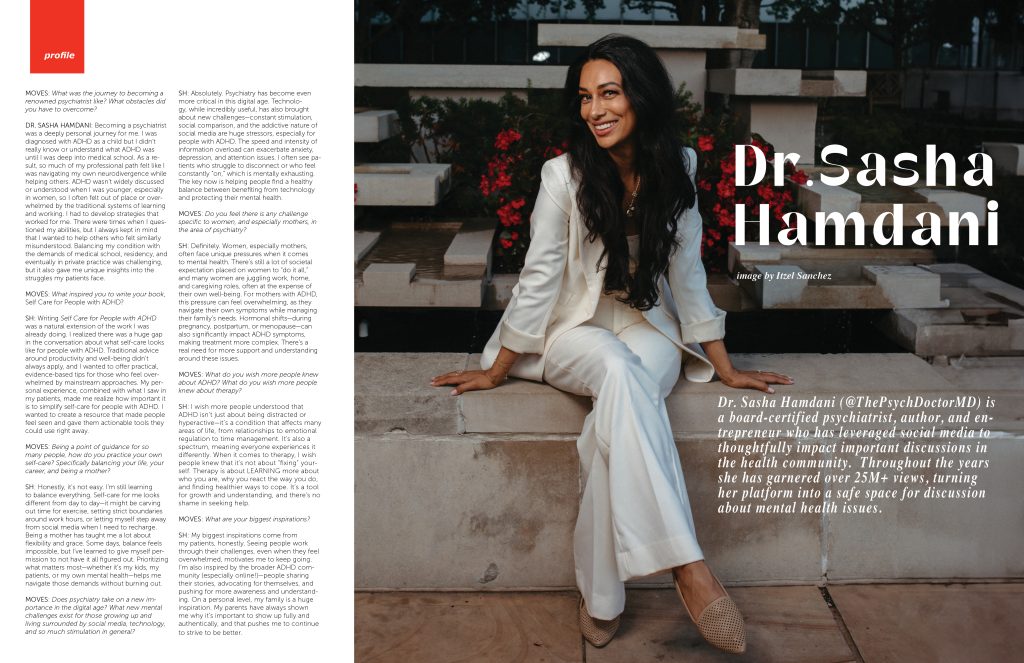
Image by Itzel Sanchez
Dr. Sasha Hamdani (@ThePsychDoctorMD) is a board-certified psychiatrist, author, and entrepreneur who has leveraged social media to thoughtfully impact important discussions in the health community. Throughout the years she has garnered over 25M+ views, turning her platform into a safe space for discussion about mental health issues.
MOVES: What was the journey to becoming a renowned psychiatrist like? What obstacles did you have to overcome?
SASHA HAMDANI: Becoming a psychiatrist was a deeply personal journey for me. I was diagnosed with ADHD as a child but I didn’t really know or understand what ADHD was until I was deep into medical school. As a result, so much of my professional path felt like I was navigating my own neurodivergence while helping others. ADHD wasn’t widely discussed or understood when I was younger, especially in women, so I often felt out of place or overwhelmed by the traditional systems of learning and working. I had to develop strategies that worked for me. There were times when I questioned my abilities, but I always kept in mind that I wanted to help others who felt similarly misunderstood. Balancing my condition with the demands of medical school, residency, and eventually in private practice was challenging, but it also gave me unique insights into the struggles my patients face.
MOVES: What inspired you to write your book, Self Care for People with ADHD?
SH: Writing Self Care for People with ADHD was a natural extension of the work I was already doing. I realized there was a huge gap in the conversation about what self-care looks like for people with ADHD. Traditional advice around productivity and well-being didn’t always apply, and I wanted to offer practical, evidence-based tips for those who feel overwhelmed by mainstream approaches. My personal experience, combined with what I saw in my patients, made me realize how important it is to simplify self-care for people with ADHD. I wanted to create a resource that made people feel seen and gave them actionable tools they could use right away.
MOVES: Being a point of guidance for so many people, how do you practice your own self-care? Specifically balancing your life, your career, and being a mother?
SH: Honestly, it’s not easy. I’m still learning to balance everything. Self-care for me looks different from day to day—it might be carving out time for exercise, setting strict boundaries around work hours, or letting myself step away from social media when I need to recharge. Being a mother has taught me a lot about flexibility and grace. Some days, balance feels impossible, but I’ve learned to give myself permission to not have it all figured out. Prioritizing what matters most—whether it’s my kids, my patients, or my own mental health—helps me navigate those demands without burning out.
MOVES: Does psychiatry take on a new importance in the digital age? What new mental challenges exist for those growing up and living surrounded by social media, technology, and so much stimulation in general?
SH: Absolutely. Psychiatry has become even more critical in this digital age. Technology, while incredibly useful, has also brought about new challenges—constant stimulation, social comparison, and the addictive nature of social media are huge stressors, especially for people with ADHD. The speed and intensity of information overload can exacerbate anxiety, depression, and attention issues. I often see patients who struggle to disconnect or who feel constantly “on,” which is mentally exhausting. The key now is helping people find a healthy balance between benefiting from technology and protecting their mental health.
MOVES: Do you feel there is any challenge specific to women, and especially mothers, in the area of psychiatry?
SH: Definitely. Women, especially mothers, often face unique pressures when it comes to mental health. There’s still a lot of societal expectation placed on women to “do it all,” and many women are juggling work, home, and caregiving roles, often at the expense of their own well-being. For mothers with ADHD, this pressure can feel overwhelming, as they navigate their own symptoms while managing their family’s needs. Hormonal shifts—during pregnancy, postpartum, or menopause—can also significantly impact ADHD symptoms, making treatment more complex. There’s a real need for more support and understanding around these issues.
MOVES: What do you wish more people knew about ADHD? What do you wish more people knew about therapy?
SH: I wish more people understood that ADHD isn’t just about being distracted or hyperactive—it’s a condition that affects many areas of life, from relationships to emotional regulation to time management. It’s also a spectrum, meaning everyone experiences it differently. When it comes to therapy, I wish people knew that it’s not about “fixing” yourself. Therapy is about LEARNING more about who you are, why you react the way you do, and finding healthier ways to cope. It’s a tool for growth and understanding, and there’s no shame in seeking help.
MOVES: What are your biggest inspirations?
SH: My biggest inspirations come from my patients, honestly. Seeing people work through their challenges, even when they feel overwhelmed, motivates me to keep going. I’m also inspired by the broader ADHD community (especially online!)—people sharing their stories, advocating for themselves, and pushing for more awareness and understanding. On a personal level, my family is a huge inspiration. My parents have always shown me why it’s important to show up fully and authentically, and that pushes me to continue to strive to be better.
